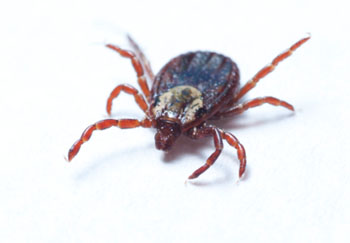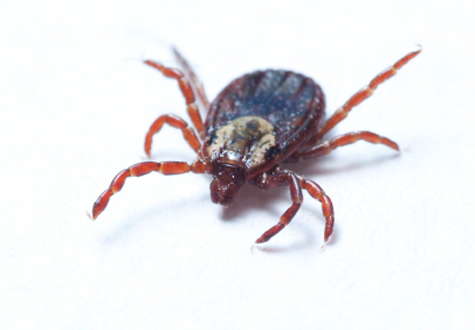
The summer brings longer days, vacation planning, planting gardens, and hiking. It also means dealing with tick-borne illness.
And, compounding the problem, the tick population has been growing. Warmer temperatures, on average, have helped the ticks thrive. While they’re biting year-round, summer is definitely the ticks’ favorite season.
Mail in the Tick
The growth of the tick population plus the rise in tick-borne illness have health officials paying extra attention, too. The Virginia Department of Health is asking people who’ve been bitten by a tick to take a quick online survey, and then mail them the tick. They will use this information to better understand where in Virginia certain tick species can be found, as well as which species are biting people.
Tick-Borne Illnesses
You probably know someone diagnosed with Lyme disease, a bacterial infection that starts with a tick bite. But every year, Virginia residents are diagnosed with two other types of tick-borne illness: Rocky Mountain spotted fever and ehrlichiosis.
“I would definitely say cases of Lyme disease are surging here. And I’ve never used that verb before when it comes to increasing incidence of anything,” says James Nataro, MD, PhD, a pediatric infectious disease expert and physician in chief of UVA Children’s Hospital.
In 2006, Virginia health officials reported 357 cases of Lyme disease to the CDC. In 2016, they reported 976 confirmed cases and another 374 probable cases. And the CDC warns that these numbers don’t reflect every diagnosed case. It estimates that around 300,000 people in the U.S. are diagnosed with Lyme disease every year.
The increase may be due to the bacterium that causes Lyme disease becoming more common in wild mammals and ticks, Nataro explains. And when those wild mammals, like deer, live near humans, the disease spreads easily.
Rocky Mountain spotted fever and ehrlichiosis are not as common as Lyme disease, but UVA Health sees a few cases each year, Nataro says.
Could That “Flu” Be a Tick-Borne Illness?
Lyme disease, ehrlichiosis, and Rocky Mountain spotted fever can have symptoms similar to flu, according to the VDH. Those include:
- Fever
- Fatigue
- Muscle aches
- Headache
“Patients with Lyme do not appear as acutely ill as those with the other two infections,” Nataro says.
Lyme disease and Rocky Mountain spotted fever have characteristic rashes. Lyme’s is a red, irregular circular rash around the tick bite. The Rocky Mountain spotted fever rash begins on the wrists and hands and spreads to the torso over hours to days, Nataro says.
And anyone infected with Rocky Mountain spotted fever or ehrlichiosis is more likely to have a fever and severe headache, he adds.
If you have these symptoms, see a doctor. Deaths from Lyme disease are very rare, but the other two diseases, particularly Rocky Mountain spotted fever, can be life-threatening if not treated, Nataro says.
All three diseases can be treated with antibiotics. In fact, says Nataro, Lyme disease complications can be treated or avoided by taking antibiotics for less than a month. “Prolonged antibiotics are never necessary,” he says.
Tick Bites Can Cause Meat Allergies, Too
Thomas Platts-Mills, MD, who leads UVA’s Division of Allergy and Clinical Immunology, researches the connection between lone star tick bites and red meat allergies. His team found that in some people, a lone star tick bite triggered the body to produce antibodies that binded to alpha-gal, a sugar found in mammals.
For people with alpha-gal syndrome, exposure to alpha-gal results in allergy symptoms. These can be mild, like hives or indigestion, or severe, like anaphylaxis. Alpha-gal is found in all mammalian meat (like pork or beef). Some people with the syndrome were also surprised that gelatin, usually made from mammal bones, could act as a trigger.
Alpha-gal is also present, in smaller amounts, in dairy products. Alpha-gal syndrome leading to dairy intolerance is rarer, but around 10% of those diagnosed with alpha-gal will also react to dairy. So, it’s good to be aware of.
Worried About a Tick Bite?
Make an appointment with a UVA primary care provider.
Avoiding Tick-Borne Illness
Different ticks spread these three diseases. In Virginia:
- Blacklegged ticks, also called deer ticks, spread Lyme disease and ehrlichiosis.
- Lone star ticks and dog ticks spread ehrlichiosis and Rocky Mountain spotted fever. Lone star tick bites can also lead to developing alpha-gal syndrome.
Don’t assume you only need to check your body for ticks after a summertime hike. Ticks can live:
- In wooded areas
- In tall grass
- On your pets, if they’re going outside
And they can turn up even during unseasonably warm days in the winter. Nataro diagnosed a case of Lyme disease in December.
If you’re spending time outside, use insect repellent with DEET and wear a hat. Wearing a long-sleeve shirt and long pants if it’s not too hot will also help keep ticks off you. Put your clothes in the dryer for 20 minutes afterwards to kill any ticks on them.
If you do spot a tick on you or your child, grasp its head with tweezers and pull firmly. And if you have trouble getting it off, see a doctor.
